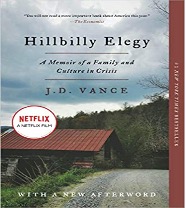Widgetized Section
Go to Admin » Appearance » Widgets » and move Gabfire Widget: Social into that MastheadOverlay zone
Hillbilly Elegy: A Memoir of a Family and Culture in Crisis
The views expressed are those of the author and do not necessarily reflect the views of ASPA as an organization.
By Susan Paddock
April 22, 2022

I chose to read J.D. Vance’s Hillbilly Elegy after hearing an interview which also discussed Trevor Noah’s Born a Crime. Both books describe the challenges of growing up in a dysfunctional society. This New York Times bestseller furthered my understanding of working poor whites and of the political and social currents of this country.
Vance was born in the Kentucky hill country, but moved to Ohio when his family sought improved employment and a better life—a northern migration that was typical of others from poor Southern communities. The book traces his life from boyhood to his successful adult career, describing how his hillbilly past has remained with him even years later. Vance uses the term “hill people” in a generic sense. “What I realized…is that I am a hill person. So is much of America’s white working class. And we hill people aren’t doing very well.”
Vance grew up in a chaotic and violent environment. “Our homes are a chaotic mess. We scream and yell at each other…. At least one member of the family uses drugs…. At especially stressful times we’ll hit and punch each other….We talk to our children about responsibility, but we never walk the talk….From low social mobility to poverty to divorce and drug addiction, my home [was] a hub of misery.”
He describes a white working class which feels forgotten and ignored by the country it loves. “[Y]ou must appreciate that much of my family’s, my neighborhood’s and my community’s identity derives from our love of country… Mamaw and Papaw taught me that we live in the best and greatest country on earth.” But to most of the working class, who live on the margins of poverty, that country has failed them. They believe it has paid more attention to communities of color than to inadequately educated poor whites, and their hard work has not been rewarded. Vance writes, “If you believe that hard work pays off, then you work hard; if you think it’s hard to get ahead even when you try, then why try at all?” “Working class whites are the most pessimistic group in America…. It’s a culture that increasingly encourages social decay instead of counteracting it.”
Vance admits his book is not an academic study but argues that his personal account reflects the well-researched works of scholars like William Julius Wilson and Robert Putnam, which find that upward mobility fell off in the 1970’s and never really recovered, affecting Appalachia and the Rust Belt most seriously. This created a destructive mentality “that I and the people like me weren’t good enough; that the reason Middletown produced zero Ivy League graduates was some genetic or character defect.”
The sense of being outsiders comes also from the “places and people that upward mobility connects” them with, which reinforce the outsider attitude. One professor, for example, believed that Yale Law School shouldn’t accept applicants from non-prestigious state schools. He did not understand that attending a public university like Ohio State University was an achievement for a working-class student. Public policies, Vance argues, often reward unproductive behaviors because policy makers do not come from and do not understand poor working-class communities. “One way our upper class can promote upward mobility, then, is not only by pushing wise public policies but by opening their hearts and minds to the newcomers who don’t quite belong.” This echoes what Boyle wrote in Tattoos: that to serve the disadvantaged and those at risk we must first walk with them and understand the burdens they carry “when we can see a community where the outcast is valued and appreciated.”
Vance’s book helps us to understand current political and social trends. The working poor communities “can’t trust the evening news. We can’t trust our politicians. Our universities…are rigged against us. We can’t get jobs. You can’t believe these things and participate meaningfully in society.” When we consider events like the January 6 invasion of the Capitol, we see the faces of people like those described in this book.
This book has been criticized by both the right and the left, but Vance insists his personal story has lessons for public policymakers and administrators. The fundamental question is “how to continue to protect our society’s less fortunate while simultaneously enabling advancement and mobility of everyone.” He argues throughout the book of the importance of a supportive family or, at the very least, of a relatively stable and supportive community—a place where public leaders could focus their policies and actions.
If you do not have time or the inclination to read the entire book, at least read the introduction, conclusion and afterward, for these pages summarize both Vance’s past and where he hopes the policies of this country will go.
Author: Susan Paddock is a Professor Emerita from the University of Wisconsin-Madison with an interest in public leadership and in state and local government. She lives in Las Vegas and can be reached at [email protected] or at Twitter at @spaddock1030. Do you have a book that is not included in traditional public administration reading lists, but which holds important lessons? Please share that with her via her email.



 (3 votes, average: 3.67 out of 5)
(3 votes, average: 3.67 out of 5)
Jonathan Justice
April 24, 2022 at 10:41 am
Dr. Paddock, thank you for this insight. Your essay helps me see the extent to which Vance’s argument is inspired by racism and racial resentment.
Readers might also be interested in this essay responding to Vance’s book:
https://www.counterpunch.org/2017/05/11/a-hillbillys-response-to-jd-vance/